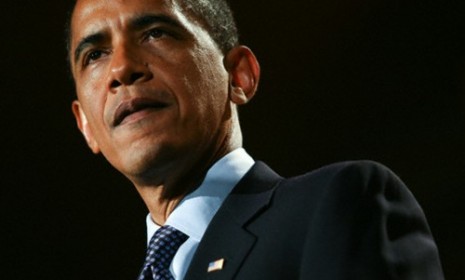Obama's financial reform: Winners and losers
After weeks in limbo, the Dodd-Frank Bill has finally passed Congress. Who stands to benefit from the banking reforms — and who will lose out?

A free daily email with the biggest news stories of the day – and the best features from TheWeek.com
You are now subscribed
Your newsletter sign-up was successful
It's taken many weeks of setbacks and stalled negotiations, but the Democrats' long-promised financial reform bill has finally been approved by the Senate and will be signed into law on Wednesday. The Dodd-Frank Act promises to put new controls on the banking industry and protect consumers. Amongst its initiatives are a Consumer Protection Financial Bureau that would oversee lenders of private loans such as mortgages and credit cards and a clampdown on derivatives trading by Wall Street banks. But who is likely to benefit from Dodd-Frank, and who will be hit by its passage? (Watch Obama announce the bill's passage)
WINNERS
Wall Street
The Week
Escape your echo chamber. Get the facts behind the news, plus analysis from multiple perspectives.

Sign up for The Week's Free Newsletters
From our morning news briefing to a weekly Good News Newsletter, get the best of The Week delivered directly to your inbox.
From our morning news briefing to a weekly Good News Newsletter, get the best of The Week delivered directly to your inbox.
While the financial reform bill will "change Wall Street around the edges," says The New York Times, it will "not threaten the finance industry's basic business model." Indeed, says Michael Hirsh at Newsweek, Dodd-Frank "effectively anoints the existing banking elite... [and] makes it likely that they will be the future giants of banking as well."
Derivatives traders
The traders of these complex packages of financial products got off fairly lightly, says Michael Hirsh at Newsweek. "Riskier" derivatives trading desks will be branched off from banks and made into separate entities so that a collapse will not affect the entire financial institution. But other derivatives, including those that trade in interest rates and foreign exchange, can still be traded in-house. Those are "easily the biggest part" of the derivatives industry, says Hirsh, meaning "some 80 to 90 percent of that business will remain within the banks." Apart from increased transparency, the derivatives industry will remain largely unchanged.
Auto dealers and pawnbrokers
A free daily email with the biggest news stories of the day – and the best features from TheWeek.com
Even though many car dealerships lend money to consumers to buy automobiles, they were exempted from the Consumer Protection Financial Bureau (CPFB) created by the bill. Barney Frank, the lead negotiator for the Democrats, said they "just didn't have the votes to do otherwise." Kimberly S. Jones, a policy advocate for lower-income neighborhoods, called the exemption "a huge mistake... these dealers have cost consumers billions of dollars." Pawnbrokers also won exemption from the CPFB.
Convenience stores
Swipe fee reform, which limits the amount credit card providers can charge for the use of credit and debit cards, is great news for convenience store and gas station owners, according to PR Newswire. The current swipe or interchange fees are "among the highest rates in the industrialized world," and are the "second largest expense item" behind labor costs for small retail businesses.
LOSERS
Bank of America
America's second largest bank warned that the new banking regulations in the financial reform bill may cost it up to $10 billion next year. The drop in payments the bank receives from domestic credit card transactions will cost it $2.3 billion, reports Cyrus Sanati at The New York Times, and it also expects the value of its global credit card service to drop between $7 billion and $10 billion. Other credit card providers will also suffer from the swipe fee reform.
Ratings agencies
The bill allows investors to sue credit-rating agencies for "deliberately or recklessly issuing faulty ratings," according to USA Today. Upon the passing of the bill, ratings agency Standard & Poor's immediately lowered the short term rating for its rival agency, Moody's. "In our opinion," said an S&P credit analyst, "the legislation will likely result in a greater instance of defending against litigation and other changes in operating practices that will likely increase operating costs and thereby reduce profitability and margins."
President Obama
The president "may struggle to reap political rewards" from the passing of Dodd/Frank, says Caren Bohan at Reuters. The complexity of the bill means many voters are unaware of its significance — or even its existence. According to an Ipsos Public Affairs poll, 38 percent of Americans "had never heard of the overhaul," and 33 percent said they had "heard of it, but knew almost nothing about the legislation."
Sources: CBS News, ABC, Washington Post, New York Times, Newsweek, Forbes
-
 Why the Gorton and Denton by-election is a ‘Frankenstein’s monster’
Why the Gorton and Denton by-election is a ‘Frankenstein’s monster’Talking Point Reform and the Greens have the Labour seat in their sights, but the constituency’s complex demographics make messaging tricky
-
 Minnesota's legal system buckles under Trump's ICE surge
Minnesota's legal system buckles under Trump's ICE surgeIN THE SPOTLIGHT Mass arrests and chaotic administration have pushed Twin Cities courts to the brink as lawyers and judges alike struggle to keep pace with ICE’s activity
-
 Big-time money squabbles: the conflict over California’s proposed billionaire tax
Big-time money squabbles: the conflict over California’s proposed billionaire taxTalking Points Californians worth more than $1.1 billion would pay a one-time 5% tax